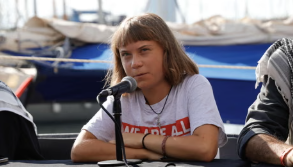– Ranjan Solomon
Greta Thunberg has become one of the most recognisable faces of climate activism. Her uncompromising language, her school strikes, and her defiant speeches to world leaders gave a jolt to complacent elites. Millions of young people looked to her as a moral compass when governments failed to act. For this, she deserves recognition.
But much of the praise surrounding Greta is exaggerated, especially within Western liberal and elite circles. She has been elevated into a celebrity prophet of climate politics, while countless grassroots voices remain invisible. She is not the author of climate justice discourse. She does not offer the structural analysis of capitalism, imperialism, or colonial extraction that defines the real struggle. Greta is more a vessel of hype than a theorist of justice.
A Language Without Justice
Climate justice is not about moral outrage alone – it is about inequality, reparations, and structural violence. It requires naming who caused the crisis, who benefits from it, and who suffers. It must grapple with colonial histories, fossil capital, and the ongoing plunder of indigenous lands and resources.
Greta’s rhetoric rarely ventures here. Her slogans – “Our house is on fire” – are powerful, but abstract. They dilute the structural asymmetries between North and South, between polluters and the dispossessed. She speaks in universal terms that comfort elites: everyone shares the problem, no one is blamed directly. This is why Greta can be applauded at Davos. She embodies urgency without indicting the systems that create catastrophe.
Gaza Flotilla: Courage and Its Limits
Take her involvement with the Gaza Flotilla, which sought to challenge Israel’s brutal blockade. Greta’s support, and the subsequent harassment she faced, displayed her courage. She lent her name to a cause that many Western liberals avoid, and for that she should be acknowledged. But here too, the media framed her role as central, while Palestinians – the actual protagonists of the struggle, risking their lives daily against siege and starvation – remained backgrounded.
Her solidarity was genuine, but minimalistic compared to the decades of Palestinian resistance. The flotilla is about Palestinians breaking a suffocating blockade, not about Greta’s presence on the sidelines. Yet global media attention gravitates toward Greta, showering her with flowers, while the Palestinian struggle itself is obscured. This dynamic mirrors how Western elites appropriate activism: a European teenager is easier to celebrate than oppressed communities demanding liberation.
The Elite’s Favourite Prophet
It is no accident that Greta is adored by mainstream institutions. She is a figure elites can embrace without fear. Her speeches scold governments but rarely connect climate collapse to global capitalism, racial injustice, or imperialist war. She does not unsettle the root causes. In contrast, when frontline activists – indigenous defenders, African farmers, Pacific Islanders – demand climate reparations, land rights, and systemic change, they are ignored or repressed. Greta becomes the global stage’s chosen messenger precisely because she is palatable.
Courage Does Not Equal Leadership
None of this is to deny Greta’s bravery. Few young people would confront power with such stark honesty. Her courage has inspired youth, sparked school strikes, and reminded the world of intergenerational urgency. But courage should not be conflated with authorship. Greta is not the writer of the climate justice narrative. She is, at best, an entry point – a side show amplified by media, not the heart of the struggle.
The Real Authors of Climate Justice
The true architects of climate justice are those on the frontlines:
Palestinians in Gaza, resisting siege and ecological collapse imposed by occupation;
Indigenous nations, protecting forests from extractive industries;
Small farmers and fisherfolk, who sustain communities while resisting corporate capture; and
Islanders in the Pacific, demanding funds for relocation and survival.
These communities articulate the justice framework Greta lacks: climate debt, reparations, decolonisation, redistribution. Their voices are rarely amplified, yet they are the ones living the consequences and offering solutions.
Celebrity Activism and Its Dangers
The danger of Greta’s celebrity lies in distortion. Activism becomes spectacle, struggles become secondary, and systemic critiques are blunted. The Greta phenomenon risks pacifying the climate debate into moral appeals and photo opportunities, while the structural violence of extractive economies continues unabated.
Her worshippers must reckon with the fact: Greta is not the movement. She is a symbol, often inflated far beyond her actual contribution. The adoration around her is disproportionate to the minimalism of her justice language.
A Useful Ally
Greta Thunberg’s presence in climate politics is not meaningless. She has demonstrated courage and awakened a generation. But the excessive worship she receives in elite spaces is a disservice to the deeper work of justice. Palestinians fighting siege, indigenous people defending forests, farmers facing drought – these are the main actors of global justice struggles. Greta is a side show adorned with media flowers.
The climate and justice movements cannot afford to confuse symbols with substance. Greta can be a useful ally, but she is not the author of change. The work belongs to those who resist not in speeches, but in lived struggle, often at the cost of their lives.
“There may be times when we are powerless to prevent injustice, but there must never be a time when we fail to protest.”




